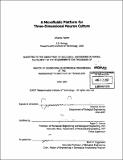A microfluidic platform for three-dimensional neuron culture
Author(s)
Varner, Johanna (Johanna M.)
DownloadFull printable version (4.310Mb)
Alternative title
microfluidic platform for 3-D neuron culture
Other Contributors
Massachusetts Institute of Technology. Biological Engineering Division.
Advisor
Roger D. Kamm.
Terms of use
Metadata
Show full item recordAbstract
Neurodegenerative diseases typically affect a limited number of specific neuronal subtypes, and the death of these neurons causes permanent loss of a specific motor function. Efforts to restore function would require regenerating the affected cells, but progress is limited by a narrow understanding of the mechanisms that underlie the generation of these neurons from their progenitor cells. In order to prevent neuronal degeneration and potentially repair or regenerate the damaged motor output circuitry, it will be necessary to understand the molecular and genetic factors that control, direct, and enhance differentiation, axonal projection and connectivity. While techniques are available to separate specific populations of neurons once they are fully-differentiated, current methods make it nearly impossible to monitor or control the development of a neural precursor in standard open culture. To carry out directed differentiation experiments effectively, it will be critical to control how signals are introduced to the cells. In this study, we present a microfluidic system to address the limitations of previous research. (cont.) The device is capable of generating a controlled gradient of chemoattractant or growth factor of interest and directing axonal growth through an extra-cellular matrix material. Once the cells have grown into the device, signals and gradients can be applied directly to either the cell bodies or the axons. This device will serve as a platform technology for future experimentation with biomaterial scaffolds for neural tissue engineering, drug design or testing, and eventually directed differentiation of neural precursor cells.
Description
Thesis (M. Eng.)--Massachusetts Institute of Technology, Biological Engineering Division, 2007. Includes bibliographical references (p. 51-53).
Date issued
2007Department
Massachusetts Institute of Technology. Department of Biological EngineeringPublisher
Massachusetts Institute of Technology
Keywords
Biological Engineering Division.